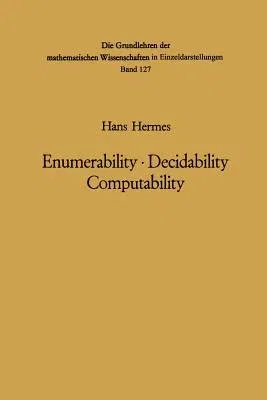Hans Hermes
(Author)Enumerability - Decidability Computability: An Introduction to the Theory of Recursive Functions (Softcover Reprint of the Original 2nd 1969)Paperback - Softcover Reprint of the Original 2nd 1969, 29 February 2012

Qty
1
Turbo
Ships in 2 - 3 days
In Stock
Free Delivery
Cash on Delivery
15 Days
Free Returns
Secure Checkout
Part of Series
Grundlehren Der Mathematischen Wissenschaften
Part of Series
Grundlehren Der Mathematischen Wissenschaften (Springer Hardcover)
Print Length
250 pages
Language
English
Publisher
Springer
Date Published
29 Feb 2012
ISBN-10
3642461808
ISBN-13
9783642461804
Description
Product Details
Author:
Book Edition:
Softcover Reprint of the Original 2nd 1969
Book Format:
Paperback
Country of Origin:
NL
Date Published:
29 February 2012
Dimensions:
23.39 x
15.6 x
1.42 cm
ISBN-10:
3642461808
ISBN-13:
9783642461804
Language:
English
Location:
Berlin, Heidelberg
Pages:
250
Publisher:
Series:
Weight:
376.48 gm

